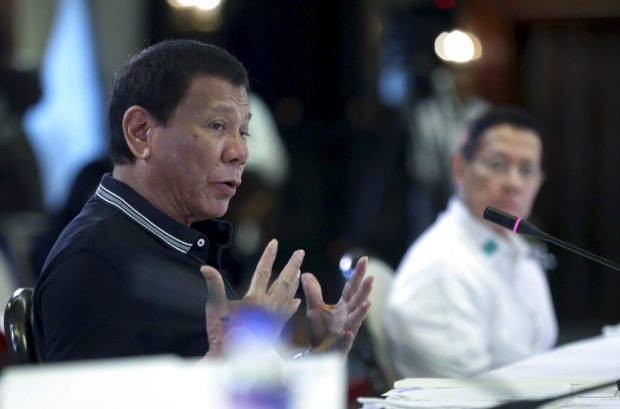MANILA, Philippines — Malacañang is upping the ante in the fight against the fast-spreading coronavirus disease, calling Congress to a special session on Monday to declare a national emergency and grant President Rodrigo Duterte broad powers, like taking over private businesses, including utilities and hotels, realigning public funds and tapping government savings.
The President has certified as urgent the proposed “Bayanihan Act of 2020,” a copy of which was widely circulated on social media on Sunday afternoon, as the Department of Health recorded 73 new cases of coronavirus infections, bringing the total number to 380 with 25 deaths.
‘Urgent measures’
The passage of the bill will “authorize the President to exercise powers necessary to carry out urgent measures in order to meet the COVID-19 national health emergency,” Malacañang said in a letter dated March 21 to Senate President Vicente Sotto III and Speaker Alan Peter Cayetano.
Even as Congress has yet to convene, questions are being raised about the additional powers being asked by Duterte, particularly the use of unspent funds, which as of Sept. 30, 2019, were estimated at P1.3 trillion, or about one-third of last year’s P3.8-trillion spending program.
Of the unspent funds, P989 billion was kept by various state agencies under the executive department, according to Sen. Panfilo Lacson.
Additional powers
Albay Rep. Edcel Lagman also observed that the additional powers sought by Duterte to realign billions of pesos in the 2020 budget might be a violation of the Constitution. The bill, among other things, would authorize the President to:
- Allocate cash, funds and investments held by any government-owned and -controlled corporation or any national government agency for whatever purpose deemed necessary.
- Take strong steps to “protect the people from hoarding, profiteering, injurious speculations, manipulation of prices, product deceptions, and cartels, monopolies, and other unscrupulous business practices.”
- Extend credit to productive sectors of the economy and to liberalize the grant of incentives for the manufacture and importation of necessary goods and equipment.
- Require businesses to prioritize and accept contracts for goods and services necessary to deal with the health emergency.
- Regulate the use of the energy supply, fuel and water and operation of public and private transportation.
- Ensure that local governments “adhere to the declared national policy and strategy, while allowing them to continue exercising their autonomy in matters undefined by the national government.”
The takeover of hotels is meant to house health workers and serve as quarantine centers or medical relief and aid distribution locations.
Public transportation can be taken over to ferry health, emergency and front-line personnel.
Subsistence allowance
Albay Rep. Joey Salceda, chair of the House ways and means committee, said the measure would have a validity of “two months, or throughout the state of calamity, whichever comes later.”
Salceda expressed support for specific provisions in the draft bill, including those exempting the purchase of necessary medical supplies and other essential goods from the procurement law, as well as support for front-liners.
“Subsistence allowances will also be given to poor families affected by the enhanced quarantine through these powers,” he said.
Over 7.5 million low-income families in Luzon must be supported by the government as many have been forced out of their jobs due the lockdown, according to Ibon Foundation.‘More political than fiscal’Lacson said, however, that the bill was more political than fiscal as it would provide extra “powers and muscle” to Duterte in responding to the economic strain caused by the COVID-19 pandemic.
For one, Lacson said the bill did not provide specific provisions on handing out financial aid to about 16.5 million Filipino families adversely affected by the state-imposed travel restrictions.
Lagman noted that provisions in the bill calling for the “cancellation” and “reallocation” of appropriated funds could constitute “transfer of funds” prohibited under Section 25 of Article VI of the Constitution.
—With a report from Jhesset O. Enano
